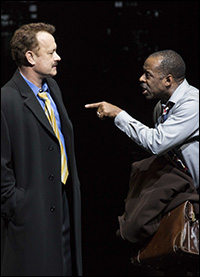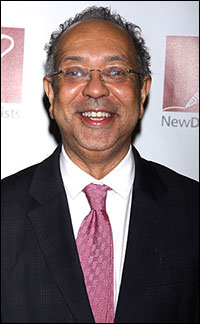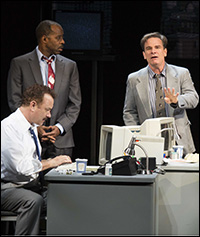
*
In Nora Ephron's Tony-nominated Best Play Lucky Guy, three-time Tony nominee Courtney B. Vance plays Hap Hairston, the real-life former editor of New York publications such as Newsday and the Daily News, who worked closely with the play's title character, Pulitzer Prize-winning journalist Mike McAlary, aka the "Lucky Guy." Although Vance's character is based on a noted editor in the world of 1980s journalism, he confessed that, after doing his research, he didn't have much material to pull from when creating his character. Vance, who received his third Tony Award nomination for his performance in Lucky Guy — having previously been nominated for Six Degrees of Separation and Fences — credits his success to another 2013 Tony nominee, George C. Wolfe, director of the new work. Following his nomination, we caught up with Vance, who talked about working with the director, exploring the world of journalism and obtaining his wife's (Oscar-nominated actress Angela Bassett) blessing to take on Lucky Guy.
You received your third Tony nomination for Lucky Guy. Your last nomination was in 1991 for Six Degrees of Separation. How did it feel to be Tony-nominated again after all these years?
Courtney B. Vance: I haven't been on Broadway in 20 years, and to come right back and get another nomination… I owe it all to [Tony-nominated director] George C. Wolfe because there was no research I could do on this gentlemen, [Hap Hairston] — there was nothing to be found on him. The play was kind of in motion, in flux, and I didn't know the landscape [of journalism in the 1980s] well because, when I was here in the mid-late 80s/early 90s, my head was in a script and doing plays… I didn't have a lot of time to get involved in the tabloids…so I was at sea during the rehearsal process. All I could do was really try to figure out what George [wanted], and I would base my character on [his direction]. So I had to work from the outside in. It was very frightening [and] nerve-wracking because, as I said, I haven't been on Broadway in a long time [and] away from family. [In taking on the show], I wouldn't see [my] kids for four or five months except for Skype and FaceTime, so it was a pretty scary time for me. But, George C. Wolfe — what a maestro. We all just called him "boss" and waited with bated breath on his every word! We all ended up in the same place, [thinking], "Okay, he knows exactly what he's doing. Let me focus on him… Let's just focus on what he asked us to do, do it — so he can see it — and then move onto the next moment."
| |
 |
|
| Vance and Tom Hanks in Lucky Guy. | ||
| photo by Joan Marcus |
Vance: It was a very hard decision. The deciding factor was [Tony-nominated co-star] Tom Hanks and George. I had heard so much about George, and I had done the reading with him a year-and-a-half prior. I knew it was going to be grueling, and I needed a strong director to guide me through it. And, if I was going to come back on Broadway, what better way to do it than with Tom and with a director who's very strong in what he saw and wanted to do. Did you have your family's blessing to do the play?
Vance: I had to get [my wife] Angela [Bassett]'s. I had told her I didn't quite know what the character was, how large or small it was — it's an ensemble [show centered] around Tom… But I said, "I really feel I need to be a part of this world, and even though it will be taxing on the family, I think it's time for me to do something like this. I don't think I should turn it down." And, she said, "Okay." And, she knew that she was going to be [busy] because she had the "Olympus Has Fallen" opening in March, and she was shooting a movie, "Black Nativity." But the kids were seven, and we had spent a lot of time [discussing] behavior… My mom was [watching them] at the time, initially, but our nanny was there full time, so we said, "Let's go."
| |
 |
|
| George C. Wolfe | ||
| Photo by Joseph Marzullo/WENN |
Vance: Nothing. I knew nothing about it… There was no research for me to do. I mean, [information] on the time period was already there. I could look through that, [but] that didn't help me with me. So I basically said, "You know what? I'll focus on the script."
I'm really glad they included the excerpt from Nora Ephron's book "I Remember Nothing" inside the Playbill. Reading that excerpt and watching what was on the stage — she really captured the world of journalism. Did you go back to Ephron's personal experience?
Vance: There were several people that producers and directors brought in to talk to us about the world. [Ephron's widower and former journalist] Nick Pileggi came in to talk to us for a couple hours about the history of the journalism in New York and what the world was like — how it used to be a working class environment. Kids would come from high school and work their way up in the newsroom. How the mob was involved in the delivering of the papers, and publishers knew that and looked the other way… It was a whole different world. That's why we spent to so much time in the beginning of the play setting the world up. There wasn't texting and Twitter-ing [during that time period]. You had to get in the street. You had to get your butt out there. It was a completely different world — you had to do some work. You couldn't sit by your smart phone. You couldn't sit at home and blog it. You had to get out in the world. You couldn't Google anything. People had to have different skills… Because of that, people who had certain skill sets rose higher. McAlary was one of those people who was good with people. He had great people skills. He happened to be in a profession where people skills mattered. He had ambition and…took off. Now, he wasn't always a nice person, but he did the job. He changed the world.
| |
 |
|
| Tom Hanks, Vance and Peter Scolari in Lucky Guy. | ||
| photo by Joan Marcus |
Vance: I didn't, and I don't think any of us did because we had George, and George had worked closely with Nora. The two of them had several drafts. Even though she wasn't there, we had all her drafts. Basically it was just figuring out how to put the puzzle together. It was all there.
You're doing a lot of narrating in Lucky Guy. What was it like to go back and forth between breaking the fourth wall and going back into your character and the scene?
Vance: That was very difficult to do. It was something that George had to teach us all how to do because there's a difference between narrating and storytelling. He wanted us to tell a story, not narrate. We didn't know what he meant. The more he was able to convey to us what the world [was, the more] it would make sense to us. But, in the beginning we'd get up there and narrate, and he'd [say], "No. No. Talk to us… You're in the world, and you have to bring us in. Bring us in." It was a very difficult transition for us to get, to understand. It took a minute, and eventually we got it.
(Playbill.com staff writer Michael Gioia's work appears in the news, feature and video sections of Playbill.com. Follow him on Twitter at @PlaybillMichael.)










